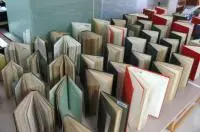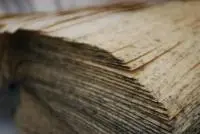Water, the giver of life. And, the worst enemy of your book collection. Ever seen a wet book? They're gross. Left untreated, mold will develop in the nooks and crannies, the paper will wrinkle, the spine will bend out of whack. You will never want to touch or read it again. But it doesn't have to be that way.
 The field of Conservation, which is dedicated to repairing and preserving books and precious objects for the long term, didn't really exist until the 20th century. It took a large-scale natural disaster to call it into being: the great flood of Florence in 1966. The city was completely unprepared for the flash flood on November 4 that submerged the city at some places in 20 feet of water. At the Biblioteca Nazionale, the largest and most important library in Europe, over one million books suffered water damage. Fortunately, so many people love Florence, the birthplace of the Renaissance. Help arrived from all over as art historians, librarians, and culture lovers came to the city and joined the angeli del fango (mud angels) to pull pull priceless objects out of the debris and begin the long process of restoration. Many objects were saved, and the event served as a call to arms to develop methods and practices to preserve and restore cultural artifacts. And now art museums and libraries employ professionals dedicated to conservation.
The field of Conservation, which is dedicated to repairing and preserving books and precious objects for the long term, didn't really exist until the 20th century. It took a large-scale natural disaster to call it into being: the great flood of Florence in 1966. The city was completely unprepared for the flash flood on November 4 that submerged the city at some places in 20 feet of water. At the Biblioteca Nazionale, the largest and most important library in Europe, over one million books suffered water damage. Fortunately, so many people love Florence, the birthplace of the Renaissance. Help arrived from all over as art historians, librarians, and culture lovers came to the city and joined the angeli del fango (mud angels) to pull pull priceless objects out of the debris and begin the long process of restoration. Many objects were saved, and the event served as a call to arms to develop methods and practices to preserve and restore cultural artifacts. And now art museums and libraries employ professionals dedicated to conservation.
While you may not be collecting rare manuscripts or priceless works of art, your collection is meaningful and of value to you. Don't assume you have to toss everything should you encounter a water problem in your home. And if that's never happened before, lucky you! Go buy a lottery ticket. But to everyone who has survived a burst pipe, a leaky roof, a flood, or a hurricane: you're not alone. You're really not alone. FEMA has been tracking disasters for a long time, and you can go to their website and see the history of flooding events in your state and specific county. Here's Illinois, for example, with each line representing a county, and each spike a flood:

So long story short: if it hasn't happened to you yet, just wait. Nature will come, just as it did for Florence. Best to be prepared. Thankfully, our friends at the library are all over it.
 I spoke with Hillary Morgan, Conservator at the University of Colorado Libraries, about what to do if you find yourself dealing with wet books. First, don't panic! Second, go to your favorite big box store and buy a jumbo package of paper towels, the highly absorbent kind. You will use all of them. Third, go home, put on your favorite music, and get to work. Start by assessing everything that is wet and form categories. Have they been wet for a long time? If so, are they showing any signs of mold? Moldy things should be separated out from all other items. We'll come back to them. In the meantime, determine if you can work on all affected items immediately. If you have 100 wet books, probably. 10,000? Maybe not. For the items you won't be able to immediately address, seal them up in a freezer bag, making sure to squeeze the air out, and put them in the freezer. When you have time, slowly defrost and follow the steps below.
I spoke with Hillary Morgan, Conservator at the University of Colorado Libraries, about what to do if you find yourself dealing with wet books. First, don't panic! Second, go to your favorite big box store and buy a jumbo package of paper towels, the highly absorbent kind. You will use all of them. Third, go home, put on your favorite music, and get to work. Start by assessing everything that is wet and form categories. Have they been wet for a long time? If so, are they showing any signs of mold? Moldy things should be separated out from all other items. We'll come back to them. In the meantime, determine if you can work on all affected items immediately. If you have 100 wet books, probably. 10,000? Maybe not. For the items you won't be able to immediately address, seal them up in a freezer bag, making sure to squeeze the air out, and put them in the freezer. When you have time, slowly defrost and follow the steps below.
With a wet (non-moldy) book, begin by interweaving paper towels every 30 to 50 pages. You can then close it and lay it flat with two larger books next to it as bookends to make sure the spine doesn't warp. Do this with all your wet books. Next, switch out wet paper towels with dry ones. Do this a few times until the book is no longer sopping wet. Then, you can stand the book up and fan out the pages so they are getting exposure to air. Circulate the air with a fan to speed up drying time. You can slowly turn the pages so all parts of the book get equal exposure to air. Finally, interweave fresh paper towels, lay the book flat, and stack some heavy books on top of it. This will press out wrinkles and eliminate any lingering moisture. Continue to check on your book over the next few days to make sure all parts of the book are dry.
 If you follow this advice as soon as your books get wet, mold will not be an issue. If, however, it has been many days or even weeks since they first got soggy, that creepy fungus will have had enough time to take up residence. Mold is not only gross, it is bad for your health. It is also very easy to develop a mold allergy, so you should ask yourself if it is worth it to interact with moldy books at all. (I choose not to because it quickly makes me feel sick.) If it's easily replaceable, toss it. If you want to keep it, then follow the drying instructions above as the most important step is to render the mold inactive. Mold grows in wet, moist environments, not dry ones. It's smart to wear gloves and a face mask for this step so you're not exposing your skin or lungs to the mold. Next, you need to remove the spores from the book. Sunlight is good for this. You can take the book outside on a sunny day and expose the moldy sections to direct sunlight, which will kill the spores. Another great option is a vacuum with a HEPA filter. You gently vacuum the moldy areas and the filter traps the spores. Finally, once the mold is dry and dusty (not fuzzy!), you can gently dab the affected areas with a solution of 25% water and 75% isopropyl alcohol. You should also wipe down the shelving the moldy books were on with the same solution and then plan to keep the books with mold separate from the rest of your collection. Forever.
If you follow this advice as soon as your books get wet, mold will not be an issue. If, however, it has been many days or even weeks since they first got soggy, that creepy fungus will have had enough time to take up residence. Mold is not only gross, it is bad for your health. It is also very easy to develop a mold allergy, so you should ask yourself if it is worth it to interact with moldy books at all. (I choose not to because it quickly makes me feel sick.) If it's easily replaceable, toss it. If you want to keep it, then follow the drying instructions above as the most important step is to render the mold inactive. Mold grows in wet, moist environments, not dry ones. It's smart to wear gloves and a face mask for this step so you're not exposing your skin or lungs to the mold. Next, you need to remove the spores from the book. Sunlight is good for this. You can take the book outside on a sunny day and expose the moldy sections to direct sunlight, which will kill the spores. Another great option is a vacuum with a HEPA filter. You gently vacuum the moldy areas and the filter traps the spores. Finally, once the mold is dry and dusty (not fuzzy!), you can gently dab the affected areas with a solution of 25% water and 75% isopropyl alcohol. You should also wipe down the shelving the moldy books were on with the same solution and then plan to keep the books with mold separate from the rest of your collection. Forever.
And what about that "old book" smell? You have options! You can seal it in a bag or container with some baking soda, replacing it every few days until the smell is gone. Or try activated charcoal. My favorite are the Gonzo Natural Magic odor rocks, which sound like a hoax but really work.
When in doubt, ask a conservator! They're so smart and helpful and have the best tools.
Questions about book conservation? Let me know in the comments!

About the author
Stephanie Bonjack is an academic librarian and musician who lives and works on the Colorado Front Range. She teaches the relentless pursuit of information, and illuminates the path to discovery. She has presented at national and international library conferences, and is especially interested in how libraries evolve to serve the needs of 21st century patrons.







